This Matcha Chiffon Cake is spongy, moist, and light as a cloud. Its lightly sweet flavor balances perfectly with earthy and savory notes from Japanese green tea powder. With its soft green matcha color, you’ll love this popular Japanese cake as a light afternoon snack.
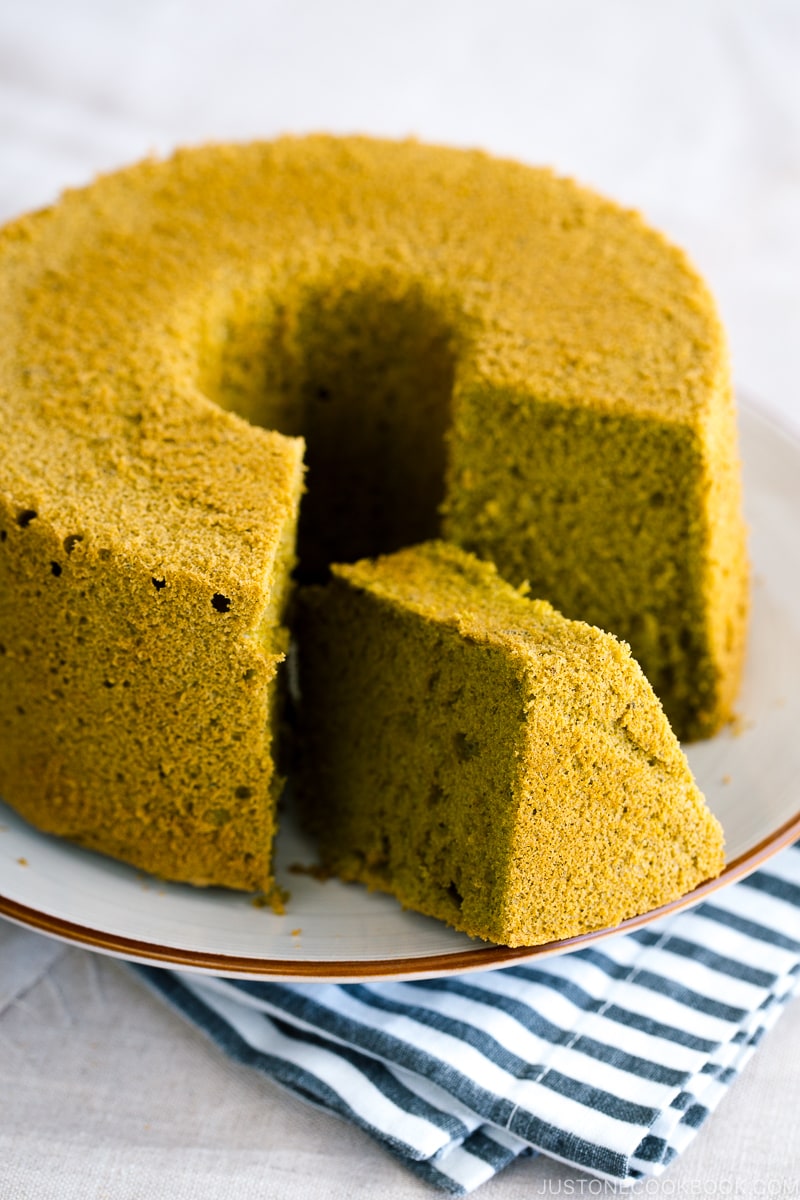
Making chiffon cake was one of my dreams since I started baking regularly last year. I always thought it was going to be difficult to make a chiffon cake. However, after some lengthy experiments with my Castella recipe, this Matcha Chiffon Cake (抹茶シフォンケーキ) was a lot easier than I expected.
If you are new to chiffon cake, it is a very light sponge cake made with vegetable oil, eggs, sugar, flour, and whatever flavor you want to add. You beat the egg whites and fold them into the oil-based cake batter so that the cake will get a fluffy texture.
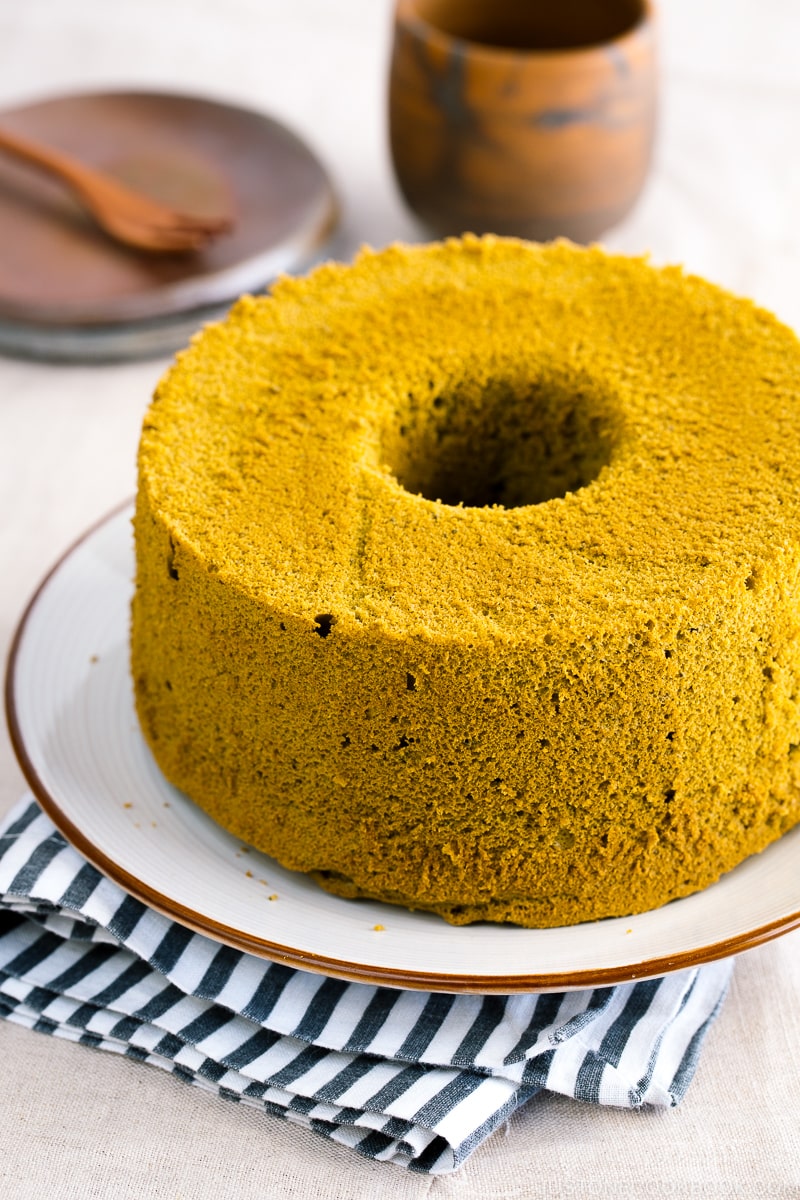
Tips on Making Matcha Chiffon Cake
1. Use the correct chiffon cake pan.
The best types are the aluminum ones with a removable base (Do not use non-stick bakeware for chiffon cake – it will not work).
I bought 17-cm and 20-cm aluminum chiffon cake pans while I was in Japan because I wanted to follow a Japanese chiffon cake recipe. If you are interested in the same pan and know someone in Japan who can receive the package for you, you can purchase one from Rakuten (かっぱ橋浅井商店つなぎ目のない17cmシフォンケーキ型). They are great!
Or, you can order this 17-cm aluminum chiffon cake pan online from Nihon Ichiban which ships internationally.
If you have a different size chiffon cake pan, then check the conversion of the ingredients in this post.
2. Do not grease the mold.
The cake needs to cling to the sides and center of the pan for support as it rises or it will collapse.
3. Use good matcha.
You want to be able to taste the subtle matcha flavor, so I recommend using good quality matcha (green tea powder). When it comes to chiffon cakes, I like them to be simple. No sweet frosting necessary. A good reason to enjoy more than 1 slice.
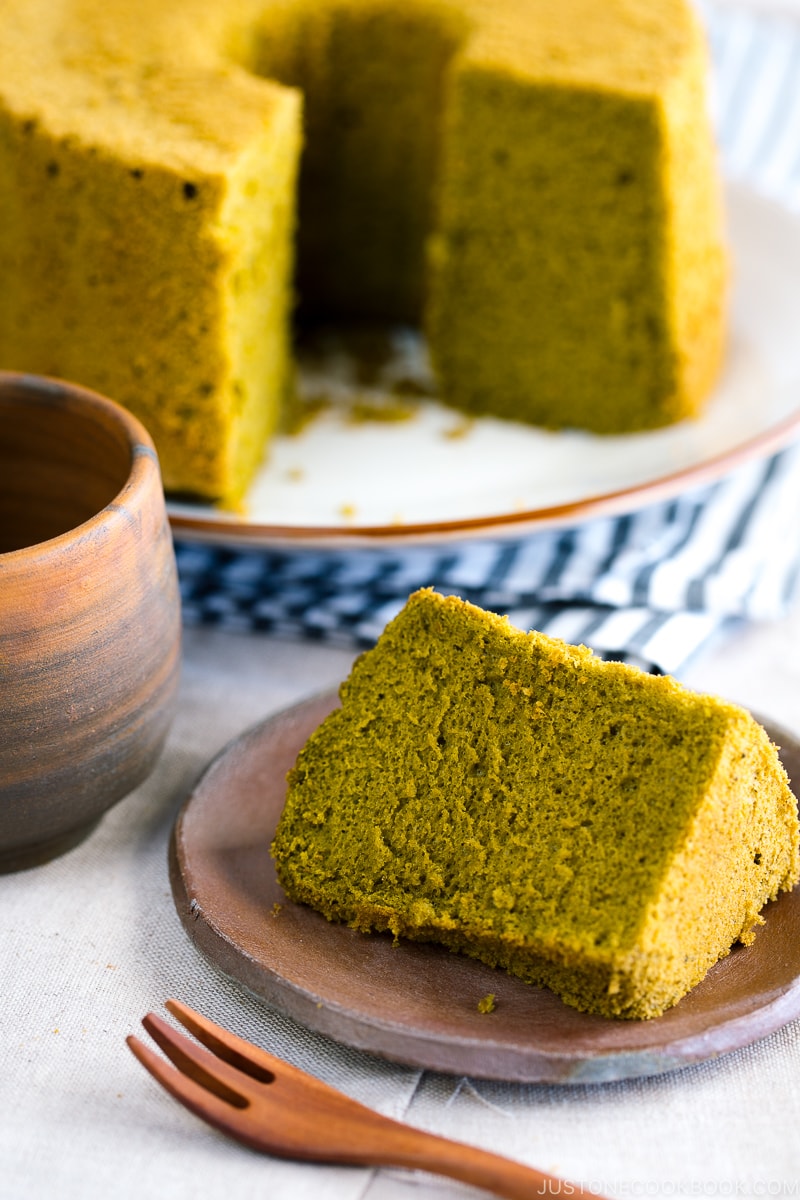
You only use 3 tablespoons of oil for this recipe, so you can expect a very light cake. If no one was looking, I would probably eat the entire 17 cm (about 7 inches) cake all by myself!
If you follow the recipe closely, you can expect a fluffy, light, and moist Matcha Chiffon Cake. It turned out just like the chiffon cake that I have tried in Japan and dreamed of making myself.
If you are a fan of not-so-sweet desserts, this is for you. Knowing how easy it is to make chiffon cakes now, I am going to try making other flavors soon. What would be your favorite flavor?
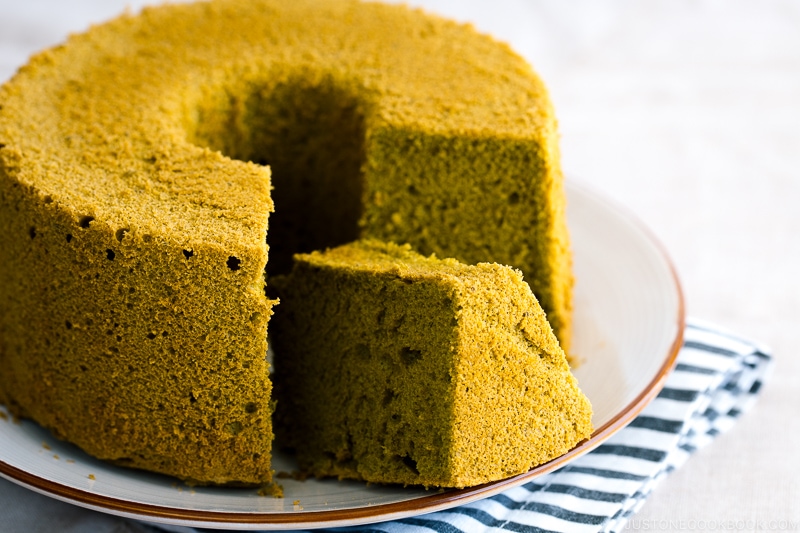
Wish to learn more about Japanese cooking? Sign up for our free newsletter to receive cooking tips & recipe updates! And stay in touch with me on Facebook, Pinterest, YouTube, and Instagram.
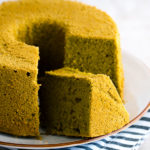
Matcha Chiffon Cake
Video
Ingredients
- 3 large eggs (50 g each w/o shell) (yolks and whites separated)
- 85 g sugar (½ cup minus 1 Tbsp; divided into thirds)
- 40 ml neutral oil (3 Tbsp minus 1 tsp)
- ¼ cup water
- 75 g cake flour (⅔ cup minus 2 tsp; weigh your flour or use the “fluff and sprinkle“ method and level it off; you can make Homemade Cake Flour)
- 1 heaping Tbsp matcha (green tea powder) (1 level Tbsp matcha weighs 6 g)
- 1 tsp baking powder
Instructions
- Before You Start: I highly encourage you to weigh your ingredients using a kitchen scale for this recipe. Click on the “Metric“ button at the top of the recipe to convert the ingredient measurements to metric. If you‘re using a cup measurement, please follow the “fluff and sprinkle“ method: Fluff your flour with a spoon, sprinkle the flour into your measuring cup, and level it off. Otherwise, you may scoop more flour than you need.
- Gather all the ingredients. Separate the egg yolks and egg whites from 3 large eggs (50 g each w/o shell). Keep the eggs whites in a stand mixer bowl; refrigerate or freeze the bowl and egg whites for 15 minutes until cold. (It‘s okay if the egg whites are partially frozen). Tip: In Japan, we chill the egg whites to make smooth, fine-textured meringue and do not use cream of tartar.
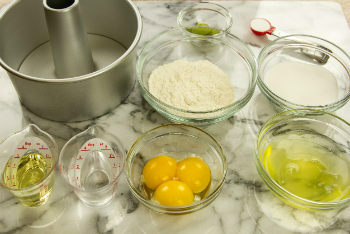
- Preheat the oven to 340ºF (170ºC). For a convection oven, reduce the cooking temperature by 25ºF (15ºC). You will need 1 17-cm (7-inch) chiffon cake pan. If you have a different size pan, read this post to adjust the ingredient measurements. Make sure you use an aluminum pan with a removable base (read my blog post for more details). Please see my Notes at the end of this recipe for additional details on ingredients, equipment, and techniques.
To Mix the Batter
- Start mixing the batter. In a large bowl, beat the egg yolks and one-third of the 85 g sugar with a hand whisk. Whisk vigorously until it‘s a creamy pale yellow color. Then, add 40 ml neutral oil and ¼ cup water and beat with a whisk to combine.

- To a flour sifter or fine-mesh sieve, add 75 g cake flour, 1 heaping Tbsp matcha (green tea powder), and 1 tsp baking powder. Sift one-third of this flour mixture into the egg yolk mixture. Whisk by hand to incorporate the dry ingredients well. Check that there are no lumps in the batter, then sift another one-third of the flour mixture into the bowl. Mix to incorporate. Then, sift in the rest of the flour mixture and whisk until just combined; do not overmix. Make sure there are no lumps in the batter. Set aside while you beat the meringue.

To Make the Meringue
- Take out the bowl of egg whites from the refrigerator or freezer. Set the bowl on the stand mixer with a whisk attachment (I used the KitchenAid Professional Series). Start whipping the egg whites on medium-low speed (Speed 4) until the egg whites are bubbly, opaque, and foamy.

- Add another one-third of the sugar and continue whisking for 30 seconds. Then, increase the mixer speed to high (Speed 10) and gradually add the remaining sugar in small increments. Beat vigorously until stiff peaks form (see the next step for how to check). It takes about 2 minutes of beating at high speed to reach stiff peaks. Tip: I usually pause beating when the egg whites are almost done. Take off the whisk attachment from the mixer and use it to hand-mix the looser egg whites near the bowl's edge into the stiffer whites near the center until it‘s all homogeneous in texture. Then, put the whisk back on and continue beating.

- To check for stiff peaks, pull up your whisk. The meringue in the bowl or on the whisk should be firm enough to hold a peak, pointing straight up (or maybe folding over a little bit just at the very tips). By this time, the meringue should have a glossy texture, too. Tip: If you overbeat the meringue, it will become very stiff and grainy and won‘t incorporate into the batter at all.
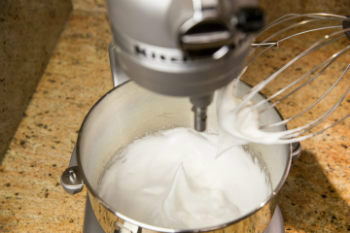
To Fold In the Meringue
- Using a spatula or hand whisk, add one-third of the meringue into the batter. Mix well by hand until it‘s homogeneous.
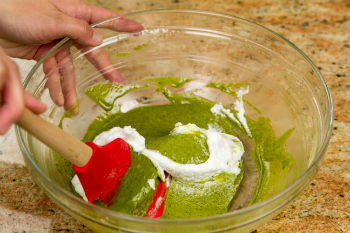
- Gently fold in the rest of the meringue in 2 or 3 increments. Take care not to deflate the air bubbles in the meringue and batter as you fold. Once it‘s well combined and homogeneous, fold the batter one last time and scrape the sides and bottom of the bowl to make sure there is no matcha accumulation. The final batter should fall in ribbons when you lift the spatula or whisk.

To Bake
- Prepare 1 ungreased 17-cm (7-inch) chiffon cake pan. From 6–8 inches high, pour the batter into the pan at just one spot to prevent air pockets from forming. While holding the removable base in place, gently tap the pan a few times on the work surface to release any air pockets in the batter. Run a wooden skewer through the batter to release any remaining air pockets.

- Put the cake pan on the middle rack of the preheated oven. Bake at 340ºF (170ºC) for 30 minutes. To check if it‘s finished baking, insert a toothpick or wooden skewer into the middle of the cake. If it comes out clean and the top of the cake springs back when gently pressed, it‘s done. Tip: If the top of the cake gets dark too quickly, cover the top loosely with aluminum foil to prevent burning. (The cake may be too close to the heat source.)
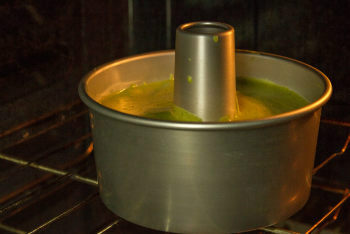
- Remove the cake pan from the oven and gently drop the pan onto the work surface to shock the cake. This stops the cake from shrinking. To cool the cake, prepare a tall, heavy bottle with a long neck, such as a glass wine bottle. Invert the center tube of the cake pan onto the bottle‘s neck and let the cake cool completely in its pan. Cooling the cake upside down helps it stretch downward and maintain its loft.
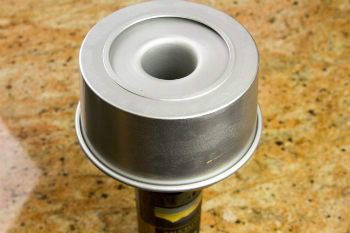
- Once the cake is completely cool, run a long offset spatula around the outer edge of the pan and a small offset spatula around the inner tube. Gently take out the removable base and cake from the outer pan. Then, run the offset spatula along the bottom of the cake to release it from the base. Tip: I used to use a knife for this step, but the tip of the knife tends to poke the cake while moving around, so I now recommend using offset spatulas.

- Invert the cake with the removable base onto a plate or cake stand. The cake will slide off the inner tube. Chiffon cake is served “upside down” with the flat bottom on top.

To Serve
- I serve the Matcha Chiffon Cake as is, but you may dust the top with confectioners‘ sugar, if you‘d like (optional). Slice and enjoy.
To Store
- I strongly recommend consuming the cake sooner for the best freshness. However, you can keep the cake covered on a plate or stand at room temperature in a cooler place for 1–2 days. To keep it longer, wrap individual slices in plastic wrap or put in an airtight container and store in the refrigerator for 3 days or in the freezer for 2 weeks.
Notes
- Make sure your beaters and mixing bowl are clean and dry. A speck of oil or egg yolk on either one can minimize the volume of the beaten egg whites.
- Avoid plastic bowls, as even clean ones may hold oily residue that can affect the beaten quality of the egg whites.
- Use a bowl that’s wide enough to keep the beaters from being buried in the egg whites.
- Do not overbeat or underbeat the egg whites or your cake may fall. Egg whites should have a stiff peak, pointing straight up (or maybe a little bit folding over just at the very tips).
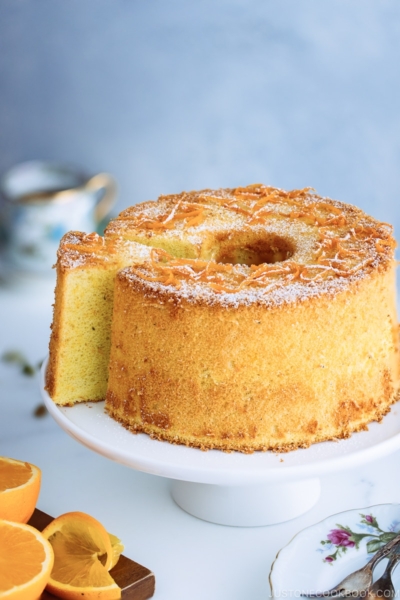
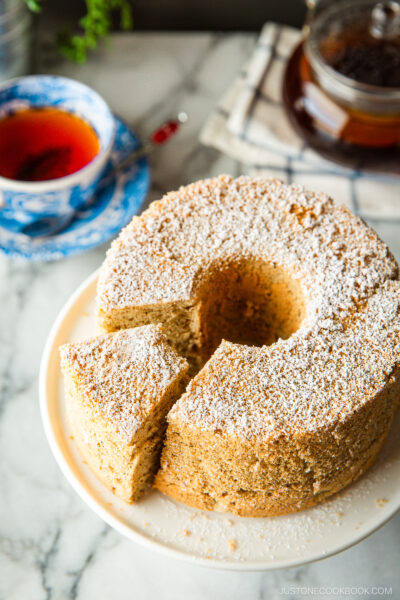
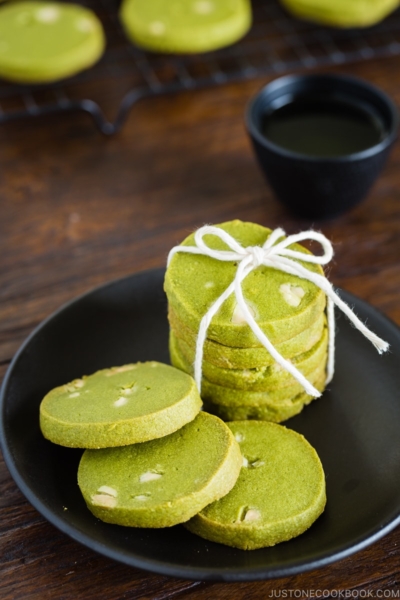
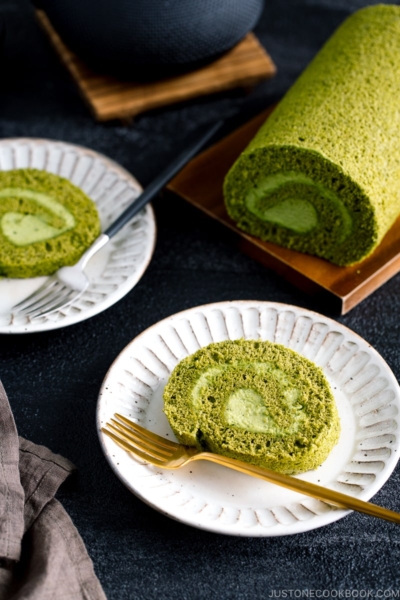
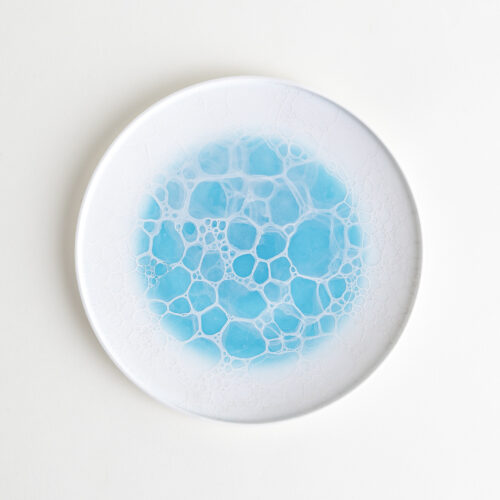
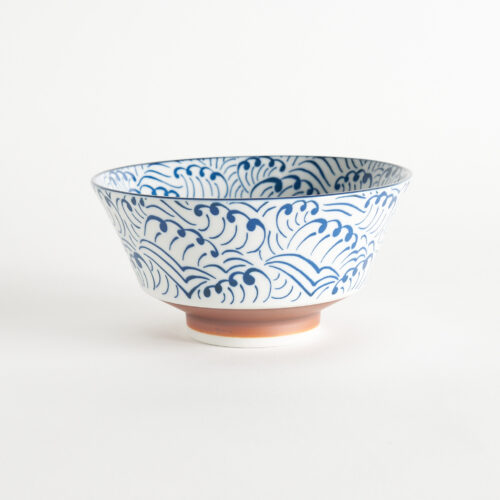
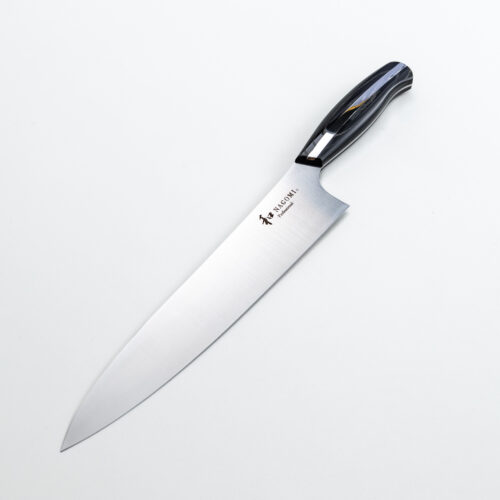
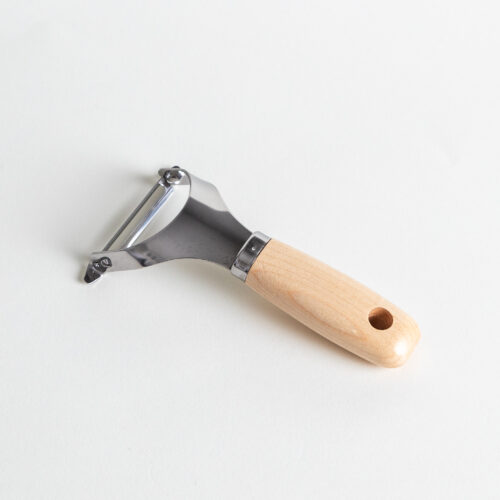

We have a home in Kamakura! Not too far. At the moment I am in Portugal, and have made this mattcha chiffon cake again for the fourth time. All the cooking utensils here are in ML and DL so have had to convert. No matter what, the cake turns out well every time. Our hosts here have requested it. Thanks so much for all your recipes. どうもありがとうございました
Hello, there! Thank you for trying Nami’s recipe.
We’re pleased to hear everyone liked Nami’s Chiffon Cake recipe. Thank you for trying it in Portugal! 🤗
Nami,
One more question. Do you have black sesame chiffon cake recipe? I am wondering if I can substitute black sesame one for one. How much sugar should I use? I am using a 6″ round pan. Thanks
Hi, Cynthia! Thank you for trying Nami’s recipe.
We haven’t tried black sesame yet, but if you grind them finely and substitute Matcha in this recipe, it should work. If you prefer more sesame taste, you can replace some of the flour with ground sesame.
As for sweetness, we believe that the sugar amount in the matcha recipe should complement the sesame flavor well. We hope this works out perfectly for you!
Hi Nami,
Really liked this recipe, thank you. One question: I don’t have tube pan so I used a 6″ round pan and adjusted the ingredients accordingly. The cake came out great but it isn’t that high (maybe 2.5″ high at the thickest point). I am wondering if I can use the ingredients for 7″ tube pan in 6″ round pan without adjusting it down since it didn’t overflow or even reach the top in oven. Thoughts?
Hi, Cynthia! Thank you for trying Nami’s recipe.
To achieve the ideal Chiffon cake height, we highly recommend using the Chiffon cake pan since the cake must stick to the sides and center of the pan for support as it rises. Otherwise, it will collapse, flattening the cake. So we’re not sure if adding extra batter will provide an airy Chiffon cake texture.
A 6-inch round cake pan typically holds 12 oz. Hope this helps!
Hi Nami,
I’ve tried your recipe, it turned well and bery delicious. My question, i want to change water with full milk. Is it possible? Thanks.
Hello, Martina. Thank you for trying Nami’s recipe.
We’ve never made this cake using milk before and aren’t sure how it will turn out. Cake may become denser than this recipe due to the fat content of the milk and the change in texture. If you try it, please let us know how it goes!
Hi! I’m so happy when I found your recipes page! I’m glad I tried it and my whole family love it! But since this recipe for 7 inch, how many grams of matcha do I need to put for 8 inch pan? Hope you will reply it! Btw, thank you for sharing this wonderful recipes! 😊
Hi Siti, We are thrilled to hear that your whole family loves this cake!
To make it in an 8-inch pan, you can add approximately 1.5 to 2 tablespoons of matcha, which is about 10 grams.
We hope this works well for you. Happy baking!
Hi, my attempt came out ok…somehow the matcha batter was way thicker than your web photo looks. And so it was hard to fold the matcha batter with the whipped egg whites. I’m wondering if anyone else had this problem. The cake came out nicely still, however with firmer bits of the matcha batter than I wasn’t able to completely blend with the egg white (I didn’t want to deflate too much of the whipped air). This was my first attempt and even with this ‘hiccup’, it was still pretty light and flavorful. Thank you for your well layed-out recipes. I often refer to your website for ideas because the steps are clearly described and the photos your provide are so helpful. Thank you again!
Hello Andie, Thank you for trying Nami’s recipe. 🙂
Did you use a scale to measure your flour? If not, you may have used too much flour.
When you add the matcha batter, make sure to do it in two steps. If you blend well in the first step, it will be easier to mix in the matcha batter.
We hope you will give the recipe another try!
Hello, I am keen to try your recipe as my son loves matcha. I have a 6 inch chiffon pan. Do I use 10g of matcha powder?
And do I minus this away from the 50g cake flour? Thank you.
Hello, Daphne. Thank you for trying Nami’s recipe.
For a 6-inch size, use about 7.5g of matcha powder and 50g of cake flour. (Please see the other ingredient amounts in this post: https://www.justonecookbook.com/perfect-chiffon-cake/)
We hope it suits both your and your son’s tastes! 🙂
Thank you. Tried today and it was successful. Thanks so much for replying!
Hello, Daphne. Awesome! Thank you very much for trying it and providing an update! 🤗
I made this again using the JOC 2/3 scaled recipe for 15cm, but instead of using the Asai Shoten tall 14cm pan, I used 2x tall 10cm pans (they are supposed to be 1/2 the volume). This time, I removed about 6.7g flour (since adding 6.7g matcha), and the chiffons turned out beautifully!
Hi, T J! Thank you for experimenting with Nami’s recipe and sharing the results with us. Your cakes look so beautiful!
This is quite useful for many readers who prefer to check out different sizes. Thank you! 🫶🏻🙂.
Thanks Naomi, I’ve been using ceremonial grade matcha which seems to give a very vibrant green color, if I keep making matcha chiffons I’ll eventually get some culinary grade. I’m also glad the posts are helpful, I’ve now tired all of the sizes of Asai Shoten “tall” pans, so plan to make a summary post in the “how to make the perfect chiffon cake” page with the JOC scaled recipe I used, baking times, etc.
Hi, T J! Aww. We can’t wait to see your summary. Thank you very much!🥰 Yes. Ceremonial-grade matcha provides the best and most beautiful color. It makes a huge difference! It would also work well in a matcha ice cream recipe!😋
I made this again, but this time I used the JOC recipe for 6” (15cm) chiffon, but baked in the Asai Shoten 14cm tall chiffon mold. It turned out really good just like the previous attempt with the 17cm recipe, but it didn’t rise quite as much as I thought it would (the 2/3 scaled recipe is similar proportions to Asai Shoten suggested recipes for 14cm tall). It was still delicious, but would have been fun to rise to the very top. The taste and texture were still good, and it didn’t feel “dense”. I made chiffon sandwiches with whipped cream and raspberries.
I noticed my mixture seemed thicker than last time, so perhaps my wide/shallow bowl caused more evaporation of wet ingredients while mixing, compared to the larger recipe? I also might remove 6.7g flour next time, since adding in matcha (I notice it says to do this the cocoa for the chocolate chiffon, but not the matcha). I might also add a few more ml of liquid to compensate (with the orange cardamom chiffon, the extra moisture from the zest seems to make it rise beautifully).
I just made the matcha chiffon cake and it turned out beautifully! The JOC recipe for 17cm actually rose up to the top of the Asai Shoten “tall” 17cm pan. Next time I might bake for a couple minutes longer (I did about 31 minutes), or perhaps try 2x 12cm (apparently the tall 12cm are 1/2 the volume of tall 17cm)
Hi T J! Thank you for using Nami’s recipe and sharing your baking experience with the 17cm tall!🫶🏻
Wow! Your cake looks fantastic! Happy baking!
Hi TJ, I have also tall chiffon pan 17cm from Asai Shoten. How many eggs should I use? Thanks in advance. Greetings from the Netherlands